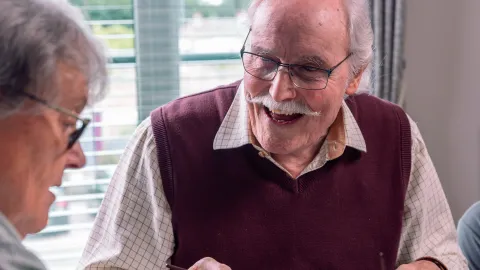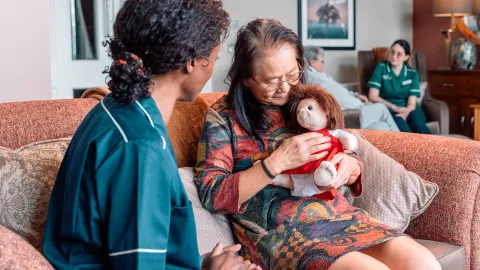8 fun exercises for older adults at home
There can be lots of things getting in the way of seniors exercising. As well as physical challenges, the weather outside or even a simple lack of motivation can make being active more of an issue.
To combat some of these hurdles, exercises need to be enjoyable and many don’t require an individual to leave the house. Supporting an elderly relative in finding the right activity for them can mean making suggestions or trying them alongside your loved one.
Here are eight exercises for older adults that can be done at home with very little equipment. They’ll help to maintain fitness, mobility and balance, all of which can contribute to a more independent life.
Knee lifts
Improve your balance by doing knee lifts on a regular basis. Completing 20 of these in one go will be enough to make a difference in the long term. To begin with, it’s a good idea to do this exercise with your hands placed on the kitchen counter for support, but as your balance gets better, you may not need it any more. Then, stand up straight and, one at a time, lift your knees up as high as possible.
Marching
Walking on the spot may not seem like a lot, but marching is great for balance and your range of movement. Hold onto the back of a chair to begin with and stand with your feet hip-width apart. Bend one knee and aim to lift your foot until your thigh is parallel to the floor. This may not be possible right away, but after a few marching sessions, it should be achievable.
Ankle circling
Improve the flexibility in your ankles, making them less likely to get injured, with some simple circling exercises. These can be done sitting down or standing up depending on your confidence levels. Lift a leg off the floor and rotate the ankle seven times in a clockwise direction. Put it back down and do the same with the opposite leg. Then repeat with the first leg but anti-clockwise and then again with the second one.
Heel-to-toe walking
A fun exercise that often elicits giggles when first tried, walking heel to toe works wonders for balance. Aim to take 20 steps like this every day to see real improvements. Place your left foot in front of your right foot, touching the heel of your left to the toes of your right foot. Then put your right foot in front of your left in a heel-to-toe fashion. Fixing a piece of tape to the kitchen lino can help your relative to stay on track.
Shoulder shrugs
Paying some attention to the shoulders can improve posture and help reduce back pain. Begin by getting comfortable in either a standing or seated position. It’s then as simple as raising your shoulders up towards your ears and then lowering them back down again. Repeat this movement 12 times and remember to practise it several times a week.
Arm curls
Strengthening the muscles in the arms with slow movements can have many advantages, such as helping to prevent osteoporosis and frailty. Grab two weights - cans of beans work well - and hold them by the side of your body, before bending your elbows to lift them towards your chest. Repeat this six times to begin with, but aim to up the number of reps over time. Arms curls can be completed in either a standing or seated position.
Simple head turns
Being able to move your head easily is very important and exercises to maintain this range of movement are often overlooked. Simply stand up straight and relax your shoulders, then turn your head slowly to one side and hold it there for a few seconds. Then repeat this on the other side. Carry out this exercise three or four times a week to see the benefits.
Snowless snow angels
We’re not advocating for the elderly to head out into the wintery weather, but snow angels offer a useful visual when trying to do this flexibility exercise. Stand flat against a wall with your head and back making contact with the surface. Then recreate the shape of a snow angel with your arms outstretched, moving them up and down to meet your legs. The improvements will be felt in the chest, back and arms.


